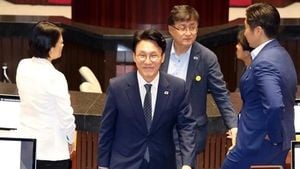The Brazilian financial market began the week with notable fluctuations as new inflation concerns and upcoming government announcements stirred apprehension among investors. The benchmark stock index, Ibovespa (IBOV), recorded a decline of 1.36%, closing at 125,394.27 points, reflecting heightened anxieties surrounding the nation’s inflation and potential interest rate hikes.
According to reports from the Broadcast, the domestic yield curve, which indicates the future interest rates on government bonds, tightened significantly on Monday, February 24. This shift coincided with the anticipation of President Luiz Inácio Lula da Silva’s scheduled announcement at 8:30 PM, which is expected to address fiscal policies directly impacting the country’s economic sustainability.
A pivotal element contributing to the decline was the uptick in inflationary predictions, with the Focus report indicating projections for inflation by 2025 increasing from 5.60% to 5.65%. This has raised fears about the future stability of Brazil’s economic framework, driving the market to seek protective measures before Lula’s address. Beto Saadia, director of Investments at Nomos, stated, "The market seeks protection especially before Lula's speech, since his historical discourse is usually not favorable to markets."
The rising interbank deposit rates, commonly referred to as DI (Depósitos Interfinanceiros), highlighted this concern with rates for January 2026 climbing to 14.650%, up from 14.503% earlier. Similarly, rates for January 2027 rose to 14.580%, and those for January 2029 increased to 14.470%. These adjustments indicate market expectations for higher borrowing costs due to the looming inflation threat.
Minister of Labor Luiz Marinho added fuel to the concerns by projecting over 100,000 formal job openings from the Cadastro Geral de Empregados e Desempregados (Caged) for January, which was significantly above analysts' expectations. This surge might point to increased consumer spending, but also indicates potential inflationary pressures as more money circulates through the economy. Tiago Castro, strategist at Cambirela, noted, "Injecting more money naturally leads to increased consumption. A marked characteristic of this government is the acceleration of monetary policy, even as the Central Bank tries to contain inflationary movements with high-interest rates."
The market's attention was also drawn to additional government initiatives, including the potential release of funds from the FGTS (Fundo de Garantia por Tempo de Serviço) for workers unable to access their balance due to choosing the anniversary withdrawal method. This news suggests increased economic stimuli but also exacerbates concerns about rising government expenses. Investors eagerly await details on these programs during Lula's address, especially concerning the Pé-de-Meia and Farmácia Popular, as it might reveal the government's fiscal strategy amid existing economic challenges.
The dollar also reflected market uncertainties, closing at R$5.75, with the U.S. currency gaining 0.42% in comparison to the real. Despite showing declines earlier this year, the dollar’s current climb signifies broader investor sentiment affected by domestic policy changes.
Analysts remain split on the impact of the latest developments. While increases in employment typically stimulate economic growth, they also complicate the inflation narrative. For February, the IPCA-15 (Índice Nacional de Preços ao Consumidor Amplo) is anticipated to demonstrate significant acceleration, estimating growth to 1.37% after just 0.11% the previous month, according to Projeções Broadcast. A high inflation figure could necessitate stricter monetary policies from the Central Bank, thereby impacting interest rates even more.
Comments from Secretary of the Treasury Rogério Ceron emphasized the importance of aligning fiscal policy with monetary policy to alleviate public debt pressure. This alignment is seen as necessary for creating space within the Central Bank to potentially lower interest rates, should economic conditions allow. During the same discussions, Ceron cited renewed interest from foreign investors purchasing Brazilian public debt, buoyed by favorable market conditions.
Despite these strategies, economists predict challenges lie ahead. The Federal Government is seeking to modernize legislation concerning public-private partnerships (PPPs), which might improve legal certainty for investment but contends with substantial operational hurdles.
The market's immediate response to the above facets offers insight not only on domestic confidence but also on broader economic health. Investors will be watching closely as the government works through infrastructure reforms and employment interventions. If successful, these measures could bolster economic growth and regain investor confidence.
For now, the Brazilian economy appears at a crossroads, with inflation raising its head alongside government fiscal initiatives aimed at stimulating growth. Whether this results in durable economic recovery or augments inflationary woes remains to be seen.



